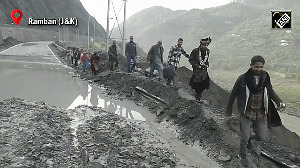I really have no problem with the World Bank. I write this because of the continued ineptness of its policies. It makes us lose time and direction again and again. Look at the latest so-called water privatisation programme of the bank and the Delhi government.
It is a 24x7 water distribution scheme. Parts of the city will be hived off to private contractors, who will ensure water supplied by public utility Delhi Jal Board is distributed to homes 24x7.
The contractor will be paid for these services, will collect water bills and bring "efficiency" to the system. That is, the contractor will reduce distribution losses -- currently between 40-50 per cent of all water supplied. The plan was developed by World Bank and its consultants for the Delhi government, which has been struggling to reform the DJB.
The reasoning is impeccable: supply constant water so that pressure in the pipes will reduce leakage from sewage pipes and, in turn, contamination of household water supply.
All was well until an intrepid non-government group, Parivartan, got its hands on the contracts of the deal. It cried foul, finding huge monies were paid to bank consultants and even fatter contracts were on the cards with multinational water distribution companies. The campaign has hit home: resident welfare organisations and political parities have joined the resistance against the World Bank-private takeover of the city's water supply.
Let us understand it better. First: how much water is needed? The consultant's report makes this mess evident. The outcome is that little is also known of the current demand (based on water received once time a day or even lesser) as compared to what it will be when water is supplied 24x7. The consultant's monitoring estimates say it should be 189 litres per capita daily. But in the project's calculations, water demand is estimated by taking into account a lesser quantum. The result is that total demand for this zone is predicted to be just 66 lpcd, or 48 million litres per day. This is jugglery. The purpose: project proponents can say there is a water surplus in the area and so their scheme is viable.
Then there is the tariff question. It is estimated it costs the government Rs 8-9 to supply 1,000 litres of water; for this, it charges roughly Rs 2. Nobody knows what collection and disposal of sewage costs, but it is estimated that it is normally five times higher than water distribution costs. The new scheme reproduces these two travesties.
The government will be in charge of water tariffs, which it promises not to raise even if households use much more water. Also, the scheme does not include the collection of sewage. In other words, more water will be supplied, which will not be paid for. More sewage will be generated, which will not be paid for.
This is nothing but selective subsidisation for the richer people of the city. This is not privatisation, and certainly not reform. The real issue is to ensure water supply to all, on an equitable basis. Meter the richer people, recover fuller costs from them and reform the sewage system. This is the reform agenda this poorly conceived programme will jeopardise. As opinions sharply polarise, crucial time will be lost.
Maybe the bank should become a debating society. That would be less wasteful: of their ideas and our time.








 © 2025
© 2025